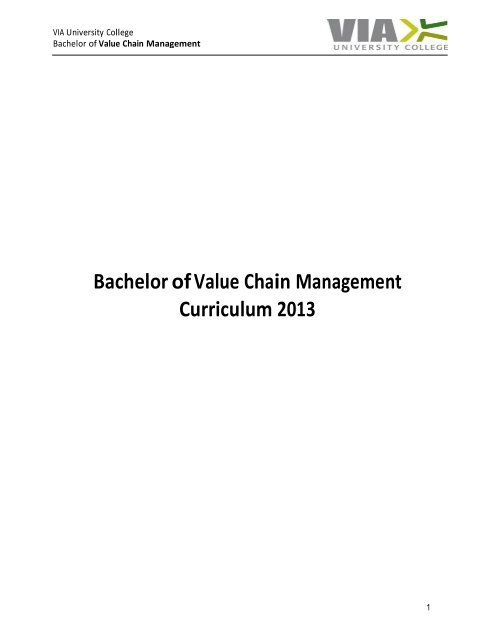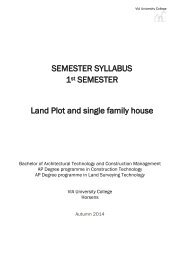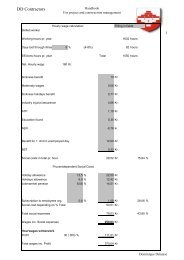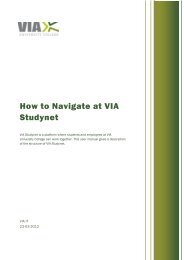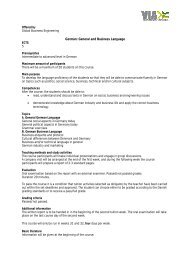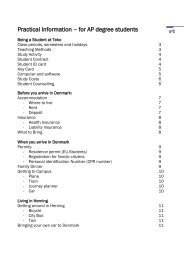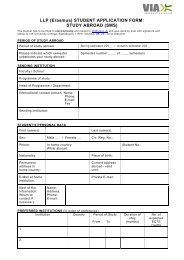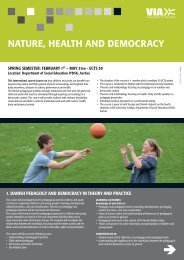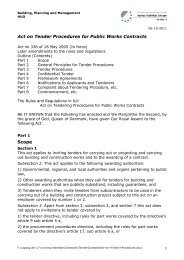Curriculum - VIA University College
Curriculum - VIA University College
Curriculum - VIA University College
Create successful ePaper yourself
Turn your PDF publications into a flip-book with our unique Google optimized e-Paper software.
<strong>VIA</strong> <strong>University</strong> <strong>College</strong><br />
Bachelor of Value Chain Management<br />
Bachelor of Value Chain Management<br />
<strong>Curriculum</strong> 2013<br />
1
<strong>VIA</strong> <strong>University</strong> <strong>College</strong><br />
Bachelor of Value Chain Management<br />
Table of content<br />
Page<br />
1 Purpose and Content of the Programme....................................................................................3<br />
§ 1 The Aim of the VCM Programme ........................................................................................... 3<br />
§ 2 Title ...................................................................................................................................... 3<br />
§ 3 Overview of Semester Themes and Programme Contents ...................................................... 4<br />
Programme contents ............................................................................................................. 4<br />
Table 1: Overview of subjects and ECTS points divided on discipline areas ............................ .5<br />
2 Programme Design....................................................................................................................... 6<br />
§ 4 Programme Structure............................................................................................................ 6<br />
Overview of semester themes and subjects: ......................................................................... 6<br />
§ 5 Course Evaluation .................................................................................................................. 7<br />
§ 6 Educational Structure ............................................................................................................ 7<br />
Model 1: The Educational Structure and Progression of the VCM programme ....................... 7<br />
Table 2: Overview of level of competency the student will acquire in each discipline............. 9<br />
§ 7 Learning Strategies................................................................................................................ 9<br />
Model 2: The progression in project competencies on the VCM programme ....................... 10<br />
§ 8 Internationalisation .............................................................................................................. 13<br />
3 Test and Examinations............................................................................................................... 13<br />
§ 9 Overview of Examinations ................................................................................................... 13<br />
§ 10 Examination Regulations .................................................................................................... 15<br />
§ 11 Course of Study and Requirements for Passing ................................................................... 15<br />
§ 12 Cheating on Exams............................................................................................................. 17<br />
§ 13 Work Placemnet............................................................................................................... 21<br />
§ 14 Bachelor Project……………………............................................................................................ 22<br />
§ 15 Examination Regulations ................................................................................................... 23<br />
§ 16 Re-Examination………………………………................................................................................. 24<br />
§ 17 Procedures and Criteria for approval.....................................................................................25<br />
§ 18 Improvement of Assignments in Approval courses …......................................................... 26<br />
4 Leave of Absence……………..……..……………………………………………………………………………………………………….26<br />
5 Time Limits………......................................................................................................................... 27<br />
6 Exam complaints………………..……….................................................................................................. 27<br />
2
<strong>VIA</strong> <strong>University</strong> <strong>College</strong><br />
Bachelor of Value Chain Management<br />
1 Purpose and Content of the Programme<br />
§ 1 The Aim of the VCM Programme<br />
The Value Chain Management Programme (The VCM programme) is a well-balanced bachelor<br />
programme focusing on Value Chain Management and Process Optimisation. The programme is<br />
a business management programme which integrates the technical and commercial approach to<br />
such subjects as Logistics and Supply Chain Management, (see Table 1 for the weight of the<br />
different disciplines in the programme).<br />
The VCM programme is focused on applied skills; thus project work, project management and<br />
implementation have a high priority in the programme and will qualify the students to manage<br />
business functions where they will have to:<br />
• Use commercial, technical and logistic knowledge as well as new research results in the<br />
fields of supply chain management and process optimization.<br />
• Be part of and monitor the interaction between various functions in the company<br />
where the aim is to co-operate to produce or procure goods.<br />
• Allow for economic and technical tasks at an executive level in the optimisation process<br />
of the value chain.<br />
• Cooperate with people of different educational and cultural backgrounds and in<br />
different executive and collaborative contexts.<br />
• Co-ordinate and monitor projects involving several functions (for instance product<br />
development projects).<br />
• Use and integrate technical and commercial research results in this specific field.<br />
• Integrate technical and commercial disciplines in logistics and SCM.<br />
§ 2 Title<br />
The student who has completed the VCM programme may use the following title: Bachelor of<br />
Value Chain Management abbreviated BA of Value Chain Management.<br />
3
<strong>VIA</strong> <strong>University</strong> <strong>College</strong><br />
Bachelor of Value Chain Management<br />
§ 3 Overview of Semester Themes and Programme Content<br />
The VCM programme comprises 210 ECTS points1 equivalent to 3½ years - 3 years of full time<br />
study and half a year of full-time work placement.<br />
The programme is divided into 7 semesters – each awarded a total of 30 ECTS points.<br />
Each semester has a theme related to Value Chain Management that integrates the subjects of<br />
the relevant semester:<br />
Semester themes:<br />
1. Market-Oriented Supply Chain Management<br />
2. Market Demand and Production Plan<br />
3. Flow Management<br />
4. Value Chain Optimization<br />
5. Work Placement<br />
6. Change Processes and Elective Courses<br />
7. Bachelor Semester<br />
The students will work with practical problems on the semester themes both in the different<br />
courses, in cross- disciplinary assignments and in study projects.<br />
On the 6th semester, the students have the opportunity to study in-depth subjects of their own<br />
choice (the elective subjects).<br />
Programme content<br />
Around half of the theoretical content of the programme consists of elements from the logistical<br />
and operational analytical subject areas. About one third consists of basic commercial and<br />
technical subjects. The remaining part consists of supporting subjects. Through the project<br />
work, the logistics and operational analytical subjects are made an integral part of the<br />
commercial and technical subjects in order for the programme to become a well-balanced,<br />
interdisciplinary education. See the weight of each discipline on the programme in table 1 on<br />
the next page.<br />
4
<strong>VIA</strong> <strong>University</strong> <strong>College</strong><br />
Bachelor of Value Chain Management<br />
Table 1: Overview of subjects and ECTS points divided on discipline areas<br />
ECTS points<br />
Market oriented supply chain management 30<br />
Market demand and production planning 20<br />
Flow management 20<br />
Value chain optimization 20<br />
Change management 15<br />
Elective subjects 20<br />
Projects 35<br />
Work Placement 30<br />
Bachelor thesis 20<br />
Total 210<br />
5
<strong>VIA</strong> <strong>University</strong> <strong>College</strong><br />
Bachelor of Value Chain Management<br />
2 Programme Design<br />
§ 4 Programme Structure<br />
Overview of semester themes and subjects:<br />
Semester Subject Course name ECTS<br />
Market Oriented Supply Chain Management<br />
Marketing Management MAMV1 5<br />
Supply Chain Management SCMV1 5<br />
1.sem.<br />
Inventory Management INMV1 5<br />
Production Technology PRTV1 5<br />
Tools for Quantitative Analysis 1 TQAV1 5<br />
Study Project V1 SPV1 5<br />
2 weeks intro course INTROV1 0<br />
Market Demand and production plan<br />
Operations Management OPMV2 5<br />
Forecasting FCV2 5<br />
2.sem. Business Economics BUEV2 5<br />
Tools for Quantitative Analysis 2 TQAV2 5<br />
Purchasing and Negotiation PUNV2 5<br />
Study Project V2 SPV2 5<br />
Flow and Optimisation<br />
Simulation and Facility Layout SFLV3 5<br />
Production Optimisation POCV3 5<br />
3.sem. Quality Management QUMV3 5<br />
Cost & Budgeting COBV3 5<br />
Innovation INNV3 5<br />
Study Project V3 SPV3 5<br />
Value Chain optimisation<br />
Design of Value Chains DVCV4 5<br />
4.sem.<br />
Strategic Management STMV4 5<br />
Investment and Finance INFV4 5<br />
Theory of Science TOSV4 5<br />
Study Project V4 SPV4 10<br />
5.sem Practical training PRV5 30<br />
Change processes and specialisation<br />
6.sem<br />
Process consultation and relationship PCRV6 5<br />
3 elective courses XXXV6 15<br />
Study Project V6 SPV6 10<br />
Bachelor Thesis semester<br />
7.sem<br />
Change Management and Communication CMCV7 5<br />
Elective course XXXV7 5<br />
Bachelor Project 20<br />
6
<strong>VIA</strong> <strong>University</strong> <strong>College</strong><br />
Bachelor of Value Chain Management<br />
§ 5 Course Evaluation<br />
Each course will be evaluated by the students during the course. Those responsible for the<br />
individual courses run through the evaluations with the students no later than 2 weeks after the<br />
evaluation date. The evaluations are performed according to the actual standards<br />
§ 6 Educational Structure<br />
The progression in the VCM programme in terms of complexity and learning methods is shown<br />
in model 1. This educational structure secures that the students obtain, maintain and develop<br />
the qualifications described in the section “purpose of the program” and in appendix A.<br />
Model 1: The Educational Structure and Progression of the VCM programme<br />
The purpose of the educational structure is that the students achieve professional, personal as<br />
well as social competencies which enable them to meet the challenges after graduation. <strong>VIA</strong><br />
<strong>University</strong> <strong>College</strong> works with three levels within the professional, personal and social<br />
competencies according to the overview below.<br />
7
<strong>VIA</strong> <strong>University</strong> <strong>College</strong><br />
Bachelor of Value Chain Management<br />
Levels<br />
Level 1<br />
Level 2<br />
Level 3<br />
Professional<br />
Competence Levels<br />
Basic Knowledge<br />
define<br />
list<br />
state<br />
summarise<br />
Understanding<br />
describe<br />
discuss<br />
explain<br />
identify<br />
Application<br />
illustrate<br />
carry out<br />
argue<br />
select<br />
assess<br />
Analysis<br />
simplify<br />
compare<br />
distinguish<br />
test<br />
translate<br />
Synthesis<br />
propose<br />
create<br />
design<br />
implement<br />
Evaluate<br />
Setting criteria<br />
Create norms<br />
Personal/Social<br />
Competence Levels<br />
Students should:<br />
- acquire fundamental knowledge and skills and<br />
develop responsibility for further learning.<br />
- learn to work independently with assignments.<br />
- develop their curiosity and courage to take part<br />
in development processes and their desire to<br />
learn.<br />
- develop their ability to have professional and<br />
personal goals and to pursue such goals.<br />
Students should<br />
- be able to familiarise themselves with<br />
complicated problems and communicate with<br />
others about the content and scope of the<br />
problem.<br />
- focus on flexibility and the ability to change.<br />
- develop their ability to think and act<br />
creatively/innovatively.<br />
Students should<br />
- take responsibility and show initiative to<br />
formulate and solve problems and to<br />
communicate their knowledge to others.<br />
- make independent and qualified decisions<br />
- have a constructive and critical approach to their<br />
own attitudes/actions/solutions and to those of<br />
other students.<br />
- be able to evaluate the value and consequences<br />
of actions/solutions choosen<br />
8
<strong>VIA</strong> <strong>University</strong> <strong>College</strong><br />
Bachelor of Value Chain Management<br />
Table 2: Overview of level of competency the student will acquire in each discipline<br />
Competence level<br />
Logistical subjects 3<br />
Economic subjects 3<br />
Technical subjects 2<br />
Elective subjects 3<br />
Subjects within Operational Analysis and IT 2<br />
Organisation and Management subjects 2<br />
Supporting subjects (Mathematics and Statistics) 1<br />
§ 7 Learning Strategies<br />
Problem-Based Learning (PBL) in teams has a high priority throughout the VCM programme.<br />
The ability to manage projects and to work in project teams is a vital competencies of a Value<br />
Chain Manager. These are competencies the student will train and develop throughout the<br />
VCM programme.<br />
The fundamental thought in PBL is that future professionals develop better and more relevant<br />
skills by being confronted with problem situations from real companies and organisations in the<br />
complex context of reality instead of being confronted with textbook problems in well-prepared<br />
portions and sequences. By being “placed in the real problem situations”, the student is more<br />
actively involved and achieves a proactive way of thinking that leads to better learning results.<br />
The planning of the programme is made so that each semester is designed to develop and<br />
maintain the progression in certain competencies. Each assignment, case study, study project,<br />
etc., is designed in accordance with the students’ level of development in terms of how much of<br />
the assignment is defined by the teacher and how much is free for the student to independently<br />
define (goal setting, problem definition, choice of content, solutions, the design and evaluation).<br />
9
<strong>VIA</strong> <strong>University</strong> <strong>College</strong><br />
Bachelor of Value Chain Management<br />
Model 2: The progression in project competencies on the VCM programme<br />
The students will be challenged with an increasing level of problem orientation and move to a<br />
high degree of self-management throughout the programme. Each semester on the VCM<br />
programme has a specific goal in terms of progression in project competencies. The students<br />
will have project methodology and train their knowledge and skills in semester projects. The<br />
projects also have the purpose of integrating the themes in the VCM curriculum. During the<br />
VCM programme, see model 2, the students advance from a subject-oriented and teachermanaged<br />
(type A project) to a problem-oriented and student-managed (type C project). The<br />
table below shows the semester themes and the pedagogical principles applied in the different<br />
semesters’ project work.<br />
10
<strong>VIA</strong> <strong>University</strong> <strong>College</strong><br />
Bachelor of Value Chain Management<br />
The progression from type A to type C project, semester by semester<br />
1st semester: Market-Oriented Supply Chain Management<br />
Pedagogical Principle Problem orientation (content)<br />
•Project goals are defined by the semester team teachers (STT).<br />
Project type: A •Problem formulation is worked out in corporation between STT and<br />
students.<br />
•Subject matter to be applied in the project is determined by STT.<br />
•Methodology applied in the work is determined by STT.<br />
•Design of Project report is determined by STT.<br />
•Main content and project solution by students.<br />
Involvement (organisation)<br />
•STT determines the members of the groups.<br />
•Students determine group organisation and project planning.<br />
•STT evaluates<br />
2nd semester: Market Demand and Production Plan<br />
Pedagogical Principle Problem orientation (content)<br />
•Project goals are defined by the semester team teachers (STT).<br />
Project type A+ •Problem formulation is worked out in cooperation by STT and students.<br />
•Subject matter to be applied in the project is determined by STT and<br />
students.<br />
•Methodology applied is determined by STT and students.<br />
•Design of project report is determined by STT.<br />
•Main content and project solution is defined by students.<br />
Involvement (organisation)<br />
•STT determines the members of the groups.<br />
•Students determine group organisation and project planning.<br />
•STT evaluates.<br />
11
<strong>VIA</strong> <strong>University</strong> <strong>College</strong><br />
Bachelor of Value Chain Management<br />
3rd semester: Flow Optimisation<br />
Pedagogical Principle Problem orientation (content)<br />
•Project goals are defined by STT and students.<br />
Project type B<br />
•Problem formulation is worked out mainly by students with the help<br />
from STT.<br />
•Subject area to be applied in the project is mainly determined by<br />
students.<br />
•The Methodology applied is determined by STT and students.<br />
•The Design of the project report is mainly determined by students.<br />
•The Main content and project solution is done by students.<br />
Involvement (organisation)<br />
•Students determine the members of the groups.<br />
•Students determine group organisation and project planning.<br />
•STT evaluates.<br />
4th Semester: Value Chain Optimisation<br />
Pedagogical Principle Problem orientation (content)<br />
•Project goals are defined by students.<br />
Project type C<br />
•Problem formulation is worked out by students.<br />
•Subject area to be applied in the project is determined by students.<br />
•The Methodology applied is determined by students.<br />
•The Design of the project report is determined by students.<br />
•The Main content and project solution is done by students.<br />
Involvement (organisation)<br />
•Students determine the members of the groups.<br />
•Students determine group organisation and project planning.<br />
•STT evaluates<br />
5th semester: Work Placement<br />
6th semester: Change Processes and Specialisation<br />
Pedagogical Principle See 4th semester<br />
Project type C<br />
7th semester: Bachelor project<br />
Pedagogical Principle See 4th semester<br />
Project type C<br />
12
<strong>VIA</strong> <strong>University</strong> <strong>College</strong><br />
Bachelor of Value Chain Management<br />
Cross-disciplinary projects<br />
The VCM programme is a cross-disciplinary programme, as the students study several disciplines<br />
as shown above. The students develops detailed knowledge in several areas and learn to<br />
integrate this knowledge into new means of reaching goals or solving problems. The students<br />
learn to practice cross-disciplinary thinking using multiple perspectives to create holistic<br />
solutions. In order to support the progression in these competencies, the students complete a<br />
cross-disciplinary project each semester on the first 4 semesters.<br />
§ 8 Internationalisation<br />
The programme is international and we prepare the students for their future career in global<br />
companies. This means that the teaching will be conducted in English. All course materials and<br />
instructions will be in English and Examinations are done in English.<br />
The students will acquire international teamwork competencies through theoretical and<br />
practical training in intercultural understanding and project work in international teams.<br />
Furthermore, it is also possible for the student to spend 1 or 2 semesters abroad.<br />
Recommended semesters are the 5th and/or the 6t semester.<br />
3 Test and Examinations<br />
§ 9 Overview of Examinations<br />
The learning outcome acquired from the courses and in the projects during the programme will<br />
be documented by the student through examinations. The examinations may be written, oral or<br />
both. Furthermore, other bases for evaluation may be used as for instance project reports,<br />
participation in courses and exercises in the documentation of knowledge, skills and<br />
competencies. The table below lists an overview of the examinations, form, assessment scale<br />
and type of examiner on the VCM programme:<br />
13
<strong>VIA</strong> <strong>University</strong> <strong>College</strong><br />
Bachelor of Value Chain Management<br />
Semester Course Examination<br />
form<br />
Market-Oriented<br />
Marketing Management<br />
see course<br />
description<br />
Supply Chain<br />
Management<br />
Inventory Management and Supply<br />
Chain Management<br />
Market Demand and<br />
Production Plan<br />
Flow and Optimisation<br />
Value Chain<br />
Optimisation<br />
Production Technology<br />
Tools for quantitative analyses 1<br />
Study Project V1<br />
Operation Management and<br />
Forecasting<br />
Business Economics<br />
Tools for Quantitative Analyses 2<br />
Purchasing and Negotiation<br />
Study Project V2<br />
Simulation and Facility Layout and<br />
Product Optimisation<br />
Quality Management<br />
Cost and Budgeting<br />
Innovation<br />
Study Project V3<br />
Design of Value Chains<br />
Strategic Management<br />
Finance<br />
Theory of Science<br />
See course<br />
description<br />
See course<br />
description<br />
See course<br />
description<br />
Study Project V4<br />
Practical placement Practical Placement See course<br />
description<br />
Change Processes and Process Consultation and<br />
See course<br />
Specialisation<br />
description<br />
Relationship<br />
Elective subjects<br />
Internal/external<br />
examiner<br />
External (5 ECTS)<br />
External (10 ECTS)<br />
Internal (5 ECTS)<br />
Internal (5 ECTS)<br />
Internal (5 ECTS)<br />
External (10 ECTS)<br />
Internal 5 ECTS<br />
Internal (5 ECTS)<br />
Internal (5 ECTS)<br />
External (5ECTS)<br />
External (10ECTS)<br />
Internal (5 ECTS)<br />
Internal (5 ECTS)<br />
Internal (5 ECTS)<br />
External (5 ECTS)<br />
External (5 ECTS)<br />
External (5 ECTS)<br />
Internal (5 ECTS)<br />
Internal (5 ECTS)<br />
External (10 ECTS)<br />
Internal (30 ECTS)<br />
External (5 ECTS)<br />
15 ECTS<br />
Thesis Semester<br />
Study Project V6<br />
Change Man. and Communication<br />
See course<br />
description<br />
External (10 ECTS)<br />
Internal (5 ECTS)<br />
Elective subjects<br />
5 ECTS<br />
Bachelor Thesis<br />
External (20 ECTS)<br />
14
<strong>VIA</strong> <strong>University</strong> <strong>College</strong><br />
Bachelor of Value Chain Management<br />
§ 10 Examination Regulations<br />
1. Assessment of study projects and courses is separate.<br />
2. The assessment method of a course is shown in the course description.<br />
3. A minimum of 100 ECTS points is tested or examined by an external examiner.<br />
4. The Bachelor thesis is assessed by an external examiner and grades are given according to<br />
the Danish 7-point grading scale.<br />
5. Concerning other matters we refer to the ministerial order no. 753 of 26 July 2005.<br />
§ 11 Course of Study and Requirements for Passing<br />
The courses and study projects of the VCM programme appear from the study plan overview,<br />
however only as abbreviations. The individual names of courses and projects, their objectives,<br />
contents, scope, disciplinary belonging, methods of instruction and working methods,<br />
prerequisites, evaluation form, etc., can be found at the website of <strong>VIA</strong> <strong>University</strong> <strong>College</strong><br />
(www.via.com)<br />
The below scheme shows the requirements for joining higher semesters<br />
Admission to Semester 3 Admission to Semester 5<br />
(practical placement)<br />
Admission to<br />
Semester 6<br />
Admission to<br />
Semester 7<br />
Bachelor thesis<br />
50 ECTS points have to<br />
be passed from semester<br />
1 and semester 2<br />
The following core<br />
courses from 1. and 2.<br />
Semester must be passed<br />
MAM, SCM, INV, OPM,<br />
FC, PUN.<br />
All courses on first and<br />
second semester must be<br />
passed.<br />
50 ECTS points have to be<br />
passed from semester 3<br />
and semester 4.<br />
The following core<br />
courses from 3. Semester<br />
must be passed SFL, POC,<br />
QUM, .<br />
Same as<br />
semester 5<br />
All courses from<br />
semester 1, 2, 3,<br />
4 and 5 must be<br />
passed<br />
Admission to<br />
being examined in<br />
the bachelor<br />
thesis:<br />
190 ECTS points<br />
must be passed.<br />
The Head of programme may grant exemption from these rules.<br />
15
<strong>VIA</strong> <strong>University</strong> <strong>College</strong><br />
Bachelor of Value Chain Management<br />
Subsection 1 – Requirements for passing in the first year<br />
• In order to pass the first year, the grades of the courses and projects in which<br />
examinations have been held according to § 9 must be 02 or higher. In addition, courses with a<br />
pass/fail evaluation must have been passed.<br />
• If the courses and projects on the first year are not passed at the ordinary examination,<br />
the student is automatically registered for re-examination in the subjects where the grade<br />
does not exceed 00 or the student has failed according to § 11.<br />
• Concerning improvement of approval, we refer to § 18.<br />
Subsection 2 - Admission to the second year of the programme<br />
• Students who have passed the first year may be admitted to the second year. Students<br />
that have passed the first year according to subsection 1 missing 10 ects point can be<br />
admitted to the second year if the possibilities of re-examination have been utilised and the<br />
core subjects from first year are passed in either an ordinary examination or a re-examination.<br />
• Students who are not admitted to the second year due to the above, and therefore<br />
have to re-do 1 st and/or 2 nd Semester will automatically transfer to the curriculum valid for<br />
this(e) semesters they are joining. If ex a student start on 1 st semester in 2013 and has to re-do<br />
1 st semester in 2014, that student will then follow the curriculum valid for 1 st semester<br />
students starting in 2014.<br />
Subsection 3 - Requirements for passing the second year<br />
• In order to pass the second year, the grades of the courses and projects in which<br />
examinations have been held according to § 9, must be 02 or higher. In addition, courses with<br />
a pass/fail evaluation must be passed.<br />
• If the courses and projects on the second year are not passed at the ordinary<br />
examination, the student is automatically registered for re-examination in the subjects where<br />
the grade does not exceed 00 or the student has failed according to § 11.<br />
• Concerning improvement of approval, we refer to § 18.<br />
Subsection 4 - Admission to Work Placement<br />
All courses on first and second semester must be passed and 50 ECTS points have to be passed<br />
from semester 3 and semester 4 and the following courses from 3 rd semester must be passed<br />
SFL, POC, QUM<br />
• Students who are not admitted to Work placement due to the above, and therefore<br />
have to re-do 3 rd and/or 4 th Semester will automatically transfer to the curriculum valid for<br />
16
<strong>VIA</strong> <strong>University</strong> <strong>College</strong><br />
Bachelor of Value Chain Management<br />
this(e) semesters they are joining. If ex. a student start on 3 rd semester in 2014 and has to redo<br />
3 rd semester in 2015, that student will then follow the curriculum valid for 3 rd semester<br />
students starting in 2015 ect.<br />
Subsection 5 - Admission to 6th semester<br />
Same as admission to work placement.<br />
Subsection 6 - Elective courses on the 6th and 7th semester<br />
It is possible to choose elective courses on the sixth and seventh semester.<br />
The student can choose between a range of offered courses and a self chosen theme which<br />
requires self-study. The self-study project must be within the themes of the VCM programme.<br />
The student has to design a course description, which has to be approved by the Head of the<br />
VCM programme. A supervisor will be provided by <strong>VIA</strong> <strong>University</strong> <strong>College</strong>.<br />
Subsection 7 - Admission to the 7th semester of the programme<br />
• In order to be admitted to the 7th semester all courses from semester 1,2,3,4 and 5<br />
must be passed,<br />
Subsection 8 - Requirements for passing 7th semester.<br />
• In order to pass the 7th semester and thus achieve the title “Bachelor of Value Chain<br />
Management”, the grades of all courses and projects in which examinations have been held<br />
must be 02 or higher. In addition, courses with a pass/fail evaluation must be passed.<br />
Subsection 9 - Requirements for being examined in bachelor thesis.<br />
• The student must have passed 190 ECTS points in order to be examined in the bachelor<br />
thesis.<br />
Subsection 10 – Credits<br />
• Students with other relevant education within the field of Value Chain Management<br />
may apply for credits. The application for credits must be sent to the Head of the Value Chain<br />
Management Programme. The student may be granted credits according to the application or<br />
be granted less or none.<br />
§ 12 Cheating on exams<br />
Disturbing behaviour and cheating in exams<br />
It is considered cheating when an examinee during exams<br />
<br />
receives unauthorised assistance or<br />
17
<strong>VIA</strong> <strong>University</strong> <strong>College</strong><br />
Bachelor of Value Chain Management<br />
assists another examinee with answers or<br />
makes use of aids other than those permitted 1<br />
When submitting a written exam, the examinee must by signature confirm that the paper<br />
was written without unauthorised assistance of any kind 2 . The signature may be digital.<br />
Plagiarism<br />
Plagiarism is considered cheating if it is found in a submitted paper in the following<br />
categories during an exam:<br />
<br />
<br />
a written product that is or has been submitted for assessment, for instance a<br />
bachelor’s project or a weekly assignment<br />
a written product that is going to be or has been part of the assessment in an oral exam<br />
– for example a paper that serves as a prerequisite for signing up for and participating in<br />
the oral exam<br />
When is it considered plagiarism<br />
It is considered plagiarism when a student tries to give the impression of being the originator<br />
of an idea, a text, a layout etc. in a written assignment when the originator is another person.<br />
It is considered plagiarism if an assignment entirely or partially appears as being produced by<br />
the student/s him/herself/themselves, if the assignment<br />
1. includes identical or almost identical reproduction of others’ formulations or work when<br />
the reproduced parts are not marked with quotation marks, written in italics, indented or<br />
with another distinct indication of source references , including page numbers or the like<br />
(cribbing/copying). This is according to the programme guidelines for preparing a written<br />
assignment, also referred to as project guidelines.<br />
2. includes substantial passages with a choice of words that are so close to another printed<br />
medium, that when compared it is obvious, that the passages could not have been written<br />
by the student without using the other printed medium (to paraphrase etc.) or<br />
3. includes the use of words or ideas of others without making references or giving credit to<br />
the originators (other kind of plagiarism),<br />
1 According to BEK. NR. 714 af 27/06/2012 (eksamensbekendtgørelsen) § 18, stk. 1<br />
2 According to eksamensbekendtgørelsens § 18, stk. 6<br />
18
<strong>VIA</strong> <strong>University</strong> <strong>College</strong><br />
Bachelor of Value Chain Management<br />
4. Reuse text and/or central ideas from one’s own work that has earlier been through an<br />
assessment or earlier published works without taking the above-mentioned points into<br />
consideration .<br />
Particularly on disturbing behaviour during tests and exams<br />
The educational institution has the authority to remove an examinee from a test or exam if the<br />
examinee is displaying disturbing behaviour, for example if the examinee is noisy or breaking<br />
the institution’s code of conduct during an exam. In less serious incidents the educational<br />
institution will first issue a warning 3 . The examination monitors will report the incident to the<br />
Head of Department.<br />
The reporting must take place immediately and without unnecessary delay. A written<br />
presentation of the case that contains information that can identify the reported examinee, as<br />
well as a short statement and the existing documentation about the incident must be attached<br />
to the report. If the incident is a repeated offense for one or more of the reported persons,<br />
this must be stated.<br />
Please read the paragraph on sanctions to find information about the penalty for disturbing<br />
behaviour.<br />
Procedures and sanctions for cheating in exams and disturbing behaviour<br />
Procedures:<br />
Who is obliged to report Anyone 4 who has a presumption of cheating is obliged to follow up<br />
on the suspicion and – if the presumption is maintained – to report it to the Head of<br />
Department.<br />
Reporting<br />
If the presumption of cheating in an exam is strengthened, the internal examiner and/or the<br />
external examiner must report the incident in writing to the Head of Department of the study<br />
programme in question 5 . At the same time the internal examiner and/or the external examiner<br />
will inform the student that the incident has been reported to the Head of Department. If an<br />
assessment has not been made at the time of reporting, the school report will contain a ‘not<br />
submitted’-note and an assessment will not be made.<br />
3 According to eksamensbekendtgørelsen § 18, stk. 3<br />
4 Everybody in this instance includes study-administration, also examination attendants, examiner, other<br />
teachers, management, library-staff, censor and fellow students.<br />
5 According to eksamensbekendtgørelsens § 18, stk 2.<br />
19
<strong>VIA</strong> <strong>University</strong> <strong>College</strong><br />
Bachelor of Value Chain Management<br />
The Head of Department<br />
When the Head of Department receives a report on cheating in an exam, he or she must<br />
decide whether to dismiss or proceed with the case.<br />
If the Head of Department decides to proceed with the case, he or she is responsible for<br />
gathering documentation that might be missing and also for inviting the student to a meeting<br />
where the student has the possibility to comment on the report.<br />
The student must receive a copy of the report with the invitation which must also inform that<br />
the premise of the meeting is presumed cheating on an exam and that the student is allowed<br />
to bring an assessor to the meeting. The assessor can counsel the student during the meeting,<br />
but cannot participate in the conversation. If it is not possible to organise a meeting, written<br />
communication must be used.<br />
If the case is dismissed by the Head of Department, the assessment will take place in the usual<br />
manner, if it has not already been made.<br />
Sanctions<br />
On the basis of the report and the meeting the Head of Department will decide whether or not<br />
it is an incident of cheating in exam and also decide what type of sanction or penalty should be<br />
used against the student. The Head of Department can only decide on sanctions or penalty if<br />
the incident, from his or her perspective, is beyond any doubt a matter of cheating.<br />
The incident is reported to the Head of Studies if - and only if –the incident is so serious that it<br />
ought to lead to suspension or expulsion from the educational institution. In all other cases the<br />
Head of Department makes the decisions.<br />
The student is informed of the final decision in writing. The person who reported the incident<br />
and the student counsellor will receive a copy – and a copy is added to the student’s folder.<br />
Types of penalty<br />
Provided that cheating on an exam is proved, one of the following penalties will be used:<br />
<br />
<br />
Warning<br />
Written or verbal warning of breaking the rules.<br />
Suspension from written exam, if a violation of the exam regulations has taken place 6 . If<br />
that is the case, the student will be registered as ‘absent’ from that particular exam.<br />
6 According to eksamensbekendtgørelsens § 18, stk 2,2.pkt.<br />
20
<strong>VIA</strong> <strong>University</strong> <strong>College</strong><br />
Bachelor of Value Chain Management<br />
<br />
<br />
Cancellation of a written paper<br />
The cancellation includes the written assignment where the cheating has been observed.<br />
The cancellation can happen even if an assessment has been made. It will be noted that<br />
the student has been unsuccessful in an exam attempt 7 . A repeated exam attempt with<br />
unauthorised assistance or non-permitted aids will result in permanent expulsion from the<br />
study programme.<br />
Expulsion or suspension from the study programme<br />
If the incident is a case of serious or repeated cheating, the student will be expelled or<br />
suspended from the educational institution 8 . The expulsion means that the student is<br />
excluded from participating in all activities at <strong>VIA</strong> <strong>University</strong> <strong>College</strong>, including all<br />
participation in classes and exams. The suspension entails that the student is excluded<br />
from participating in all activities at <strong>VIA</strong> <strong>University</strong> <strong>College</strong>, including all participation in<br />
classes and exams in the suspension period. In the case of suspension the student is<br />
registered as taking a leave of absence during the period in question. After the suspension<br />
period, the student is automatically readmitted as a student at <strong>VIA</strong> <strong>University</strong> <strong>College</strong> in<br />
the study programme in question.<br />
Apart from the above mentioned penalties, the incident may be reported to the police if it<br />
concerns civil law.<br />
§ 13 Work Placement<br />
The purpose of the placement period is for the student to gain insight in the practical work<br />
within logistics and supply chain management combined with integrated application of the<br />
concepts and methods acquired through the commercial, technical, logistical and systematic<br />
disciplines.<br />
Subsection 1 - Selection of placement companies<br />
• The students themselves are responsible for selecting a placement in a company in<br />
Denmark or abroad<br />
Subsection 2 - Working methods<br />
• In the placement period, the student will work individually or in a group to execute<br />
operational or project- based assignments within value chain management. The student<br />
organises the placement in such a way that it incorporates a number of practical elements<br />
7 According to eksamensbekendtgørelsens §18, stk. 5<br />
8 According to eksamensbekendtgørelsens § 18, stk. 4<br />
21
<strong>VIA</strong> <strong>University</strong> <strong>College</strong><br />
Bachelor of Value Chain Management<br />
corresponding to the assignments of a recently graduated Bachelor of Value Chain<br />
Management. The students have to hand in a placement agreement, that has to be approved<br />
prior to the placement period.<br />
Subsection 3 - Supervision<br />
• A supervisor is attached to the placement student. The supervisor’s job is to be of<br />
assistance to the student in case any problems occur between the student and the host<br />
company which the student is not able to handle.<br />
Subsection 4 - Assessment<br />
• The basis of the assessment of the work placement is a log and a report on an elected<br />
topic supplemented by a lecture. A student’s work placement period is assessed in a seminar<br />
assisted by the supervisor. The grading scale used is pass/fail. If the grade is “fail”, the<br />
supervisor for the assessment shall give a, written explanatory statement in support of this,<br />
which explains why the student has failed.<br />
§ 14 Bachelor Project<br />
The purpose of the bachelor project is to document the extent to which the student is capable<br />
of fulfilling the objective of the VCM study programme as stated in §1. The final project is<br />
completed on the 7th semester awarding 20 ects points.<br />
Subsection 1 - Co-operation<br />
• The final project is prepared in groups of 2 or 3 students. The project is prepared in cooperation<br />
with a company.<br />
• <strong>VIA</strong> <strong>University</strong> <strong>College</strong> is responsible for placing supervisor(s) at the students’ disposal<br />
throughout the preparation of the final project.<br />
Subsection 2 - Topic<br />
• The topic of the final project can be chosen on the 6th semester – preferably on the<br />
basis of an assignment given by the student’s placement company. The topic of the final<br />
project is chosen by the student and presented to <strong>VIA</strong> <strong>University</strong> <strong>College</strong> for approval before a<br />
specific deadline.<br />
Subsection 3 - Introduction<br />
22
<strong>VIA</strong> <strong>University</strong> <strong>College</strong><br />
Bachelor of Value Chain Management<br />
• The students themselves make a project description containing purpose, delimitation<br />
and assignment formulation in addition to a plan for the execution of the project. The project<br />
supervisors will be available during this work.<br />
• Introduction and a plan must be approved by the project supervisors and both aspects<br />
may be changed throughout the project phase on approval by the project supervisors if they<br />
find it necessary.<br />
Subsection 4 - Evaluation<br />
• The evaluation of the final project is based on a written report on the work and a<br />
discussion on it. The discussion aims to establish to what extent the objective of the study<br />
programme stated in §1 has been fulfilled.<br />
• The discussion aims to establish the contribution of the individual student while<br />
working with the project in case this is not evident from the report.<br />
• The evaluation is made by an external examiner in addition to the teachers involved.<br />
Subsection 5 - Grading<br />
• The final project is graded according to the Danish 7-point grading scale. In case the<br />
grade 00 or below is given, the teacher(s) and external examiner give a joint, written<br />
explanatory statement in support of this.<br />
Subsection 6 - Requirements for passing the examination<br />
The grade 02 is the lowest pass grade for the final project.<br />
§ 15 Examination Regulations<br />
The test form will be determined by <strong>VIA</strong> <strong>University</strong> <strong>College</strong> before the preparatory tuition<br />
appropriate to the test is initiated. The test form is stated in the course description and may<br />
include that it is mandatory for the student to have carried out certain assignments in order to<br />
be registered for the examination.<br />
Subsection 1<br />
• Evaluation of the students’ performance in tests, projects and the final project is based<br />
23
<strong>VIA</strong> <strong>University</strong> <strong>College</strong><br />
Bachelor of Value Chain Management<br />
on an assessment of how well the students have fulfilled the objectives of the course, which<br />
the test/project should obviously involve.<br />
• The relevant objectives are compared with the level to be expected at that particular<br />
level of the course structure.<br />
Subsection 2<br />
A student can maximum register for the same test 3 times The Head of Department may grant<br />
exemption from 3 attempts . Re-examination is, however, conditioned by the fact that the<br />
previous test has not been given a grade 02 or higher.<br />
§ 16 Re-Examination<br />
The students are automatically registered for re-exam if they fail ordinary exam<br />
The examination form may change from ordinary exam to re-exam<br />
Subsection 1 - Re-examinations on courses graded according to the Danish 7-point grading<br />
scale<br />
• A student cannot participate in re-examination unless the student has participated in<br />
the ordinary exam.<br />
• Re-examinations will normally be conducted just before the next semester or in the<br />
beginning of the next semester.<br />
Subsection 2 - Consequences of not passing the first examination attempt:<br />
• If the student does not achieve a sufficiently high grade at the ordinary examination,<br />
the student automatically will be registered for the re-examination. The student can cancel<br />
the re-examination and participate in the course one more time and register for the<br />
examination of the following examination period. For time limits refer to “5 Time limits”<br />
Subsection 3 - Re-examination on courses using a pass/fail grading scale<br />
• If a student does not pass such a course in the first attempt, he may improve the<br />
course work by agreement with the supervisor and register for a re-examination.<br />
• If a pass grade is not obtained at the re-examination, the student must take the course<br />
again and register for a second re-examination in the next ordinary examination period. .<br />
24
<strong>VIA</strong> <strong>University</strong> <strong>College</strong><br />
Bachelor of Value Chain Management<br />
§ 17 Procedures and Criteria for Approval<br />
Approval of a course is determined by an assessment of the extent to which the goals set by<br />
the course have been fulfilled at the end of the course. (If the goal has been fulfilled to the<br />
extent that it would be given a pass grade or the grade 02 or higher in a test, the course shall<br />
be approved). Approval can also require a certain attendance rate by the student.<br />
The basis of the assessment may be:<br />
• study activity on the course<br />
• written assignments including home work<br />
• participation in exercises<br />
• exercise reports accomplished<br />
• course work, reports and practical exercises<br />
• tests intended for guidance during the instruction time (however, approval should not<br />
be obtained on the basis of one isolated, decisive test)<br />
The basis of the assessment of each single course will appear from the course description<br />
under the heading “Basis for Course Approval”.<br />
At the end of a course, the teacher will provide the study office with a list indicating for each<br />
student whether the course has been assessed approved/failed.<br />
The study office reports the assessment “failed” in writing to the students involved. Via the<br />
study guidance office, a student who has received a “failed” assessment can demand an<br />
explanation from the relevant teachers.<br />
Students have a maximum of 3 attempts to pass an examination. The Head of Department may<br />
grant exemptions from these rules.<br />
<strong>VIA</strong> <strong>University</strong> <strong>College</strong> can give permission to a student who has not gained approval to sit for<br />
a test instead of participating in the instructions for the 2nd and 3rd time. In that case, <strong>VIA</strong><br />
<strong>University</strong> <strong>College</strong> will appoint an additional examiner among its teachers. In the third approval<br />
attempt, the student may demand the participation of an external examiner appointed by the<br />
Ministry of Science, Innovation and Higher Education.<br />
25
<strong>VIA</strong> <strong>University</strong> <strong>College</strong><br />
Bachelor of Value Chain Management<br />
§ 18 Improvement of Assignments in Approval Courses<br />
Students who have not passed an approval course because of lacking attendance will have to<br />
take the course again.<br />
Other students who have not passed an approval course in the first attempt may improve the<br />
paper by agreement with the supervisor..<br />
The third time an approval course is assessed; the student may demand the participation of an<br />
external examiner.<br />
4 Leave of Absence<br />
It is possible to apply for leave of absence from the study programme. All applications must be<br />
forwarded in writing to the Head of Department and will be assessed individually.<br />
The following is applicable:<br />
• Leave of absence cannot be granted until the exams of the first year have been passed<br />
(at least 60 ECTS credits)<br />
• Leave of absence is usually granted for the entire semester (e.g. maternity leave and<br />
leave of illness may be exceptions) and one full year is recommended if the leave of absence is<br />
awarded within the first two years of study.<br />
• During leave of absence, the students are considered non-active as regards SU and the<br />
calculation of the study period<br />
• Leave of absence may be granted for up to two semesters without reason<br />
• In case of unusual circumstances, leave of absence may be granted for up to four<br />
semesters<br />
• After completed leave of absence, the student will be admitted under the curriculum in<br />
effect.<br />
26
<strong>VIA</strong> <strong>University</strong> <strong>College</strong><br />
Bachelor of Value Chain Management<br />
5 Time Limits<br />
The exams in the first two semesters of the programme must be passed no later than two<br />
years after the commencement of studies. The exams in the first four semesters of the<br />
programme must be passed no later than four years after the commencement of studies.<br />
The entire programme must be completed no later than seven years after the commencement<br />
of studies.<br />
<strong>VIA</strong> <strong>University</strong> <strong>College</strong> may, in special cases, grant exemption from the above time limits.<br />
6 Exam complaints<br />
Complaints can be submitted in the following circumstances:<br />
• The basis of examination; exam questions, tasks and in relation to educational goals<br />
and requirements<br />
• Examination procedure<br />
• Review/result of the exam<br />
The complaint must be in writing and reasoned/justified and individually submitted by the<br />
student no later than 2 weeks after the student is informed of the result of the exam. 9<br />
The complaint must be sent to the Head of Department who will manage and evaluate it. The<br />
student is entitled to receive a copy of the assignment given by the institution and a copy of<br />
the student’s submitted assignment in the case of a written exam. 10 As a rule, the Head of<br />
Department presents the complaint to the original adjudicator: internal and external examiner.<br />
The examiners have 2 weeks to submit their professional opinion to the student’s questions.<br />
The student must be given the opportunity to comment on the professional opinions and has<br />
one week to reply.<br />
The Head of Department determines the outcome of the complaint based on the comments<br />
and the opinions. The decision must be in writing/written and substantiated and the result<br />
may be as follows:<br />
• Reassessment. Except for oral examination.<br />
• Reexamination or<br />
• The complaint is dismissed<br />
9 2 weeks = 14 calender days<br />
10 Eksamensbekendtgørelsens § 39, stk. 3 (executive order of examination)<br />
27
<strong>VIA</strong> <strong>University</strong> <strong>College</strong><br />
Bachelor of Value Chain Management<br />
The adjudicators must be in agreement, if the appeal is dismissed by the Head of<br />
Department. 11<br />
The student must be informed as soon as the decision has been made. If the result is a<br />
reexamination or a reassessment, the student must be informed of the fact that this can result<br />
in a lower grade. 12<br />
Re-examination or re-assessment<br />
An offer of reexamination or reassessment must be accepted no later than 2 weeks after the<br />
student is informed of the decision. An acceptance hereof cannot be withdrawn. Reassessment<br />
or reexamination shall not be conducted, if the deadline is not respected.<br />
Reexamination or reassessment must take place as soon as possible. If a diploma is issued, the<br />
institution must take the diploma back until the assessment is available and subsequently issue<br />
a new diploma. 13<br />
In the case of reexamination and reassessment, new examiners will be assigned.<br />
If the result of a complaint is reexamination or reassessment, the decision applies to all<br />
examinees if the original exam is equally inadequate to the former.<br />
Particularly about reassessment<br />
In the case of reassessment, the examiners must have the files submitted: Exam questions or<br />
assignment, exam paper, the complaint, the original examiners’ opinions including comments<br />
from the student and the decision from the institution or the Ministry. The examiners will<br />
inform the educational institution of the result of the new assessment, including a written<br />
evaluation of the assessment. The educational institution will inform the student about the<br />
assessment and the evaluation hereof.<br />
Examination questions formulated by the Ministry<br />
The educational institution will immediately forward its own evaluation as well as complaints<br />
regarding examination questions, formulated by the Ministry of Science, Innovation and Higher<br />
Education, to the aforementioned Ministry.<br />
11 Eksamensbekendtgørelsens § 43, stk. 2<br />
12 Eksamensbekendtgørelsens § 43, stk. 3<br />
13 Eksamensbekendtgørelsens § 44, stk. 1<br />
28
<strong>VIA</strong> <strong>University</strong> <strong>College</strong><br />
Bachelor of Value Chain Management<br />
Appeal of the decision<br />
In case the student disagrees with the decision, he/she has the opportunity to lodge an appeal<br />
against the decision no later than 2 weeks after being informed of this decision. The appeal<br />
must be in writing and substantiated and sent to the Head of Department, who will appoint an<br />
appeals board.<br />
Particularly about appeals board 14<br />
The Head of Department will appoint an appeals board as soon as possible after the<br />
submission of the appeal. Permanent appeals boards can be appointed. <strong>VIA</strong> university <strong>College</strong><br />
will defray the cost of the appeals board. The board consists of two external examiners, an<br />
examination eligible teacher and a student in the subject area.<br />
About the selection:<br />
• The president of the corps for external examiners will designate the two external<br />
examiners and designate one of them as president of the board. The president can<br />
designate himself as external examiner or as president of the board.<br />
• <strong>VIA</strong> <strong>University</strong> <strong>College</strong> will designate the examination eligible teacher and the student.<br />
The appeals board is covered by the Law of Public Administration, including conflicts of<br />
interests and confidentiality.<br />
All members of the board must participate in board discussions and receive all documents for<br />
the board to be quorum. The discussion can be in writing and digital if there is consensus<br />
among the board members of a written process. If consensus among the board members<br />
cannot be reached, the discussion will terminate at a meeting where all members must be<br />
present. If the discussion ends by voting and there is a tie, the vote of the president is decisive.<br />
If the board is aware of errors of an exam during the process, <strong>VIA</strong> <strong>University</strong> <strong>College</strong> must be<br />
informed hereof and <strong>VIA</strong> will decide how to correct the error in accordance with the Executive<br />
Order of examination in chapter 9. 15<br />
The appeals board’s decision<br />
The material which formed the basis for the initial decision is the basis for the new decision<br />
made by the board. 16 The decision made by the board must be in writing and substantiated<br />
and may result in the following:<br />
• Reassessment. Except by oral examination.<br />
14 Eksamensbekendtgørelsens § 46<br />
15 Eksamensbekendtgørelsens § 47<br />
16 Eksamensbekendtgørelsens § 48<br />
29
<strong>VIA</strong> <strong>University</strong> <strong>College</strong><br />
Bachelor of Value Chain Management<br />
• Reexamination or<br />
• The complaint is dismissed<br />
The Head of Department must be informed of the decision by the board as soon as possible. In<br />
the case of a winter exam, no later than 2 months and in the case of a summer exam, no later<br />
than 3 months after the Head of department has been informed.<br />
<strong>VIA</strong> <strong>University</strong> <strong>College</strong> must inform the student as soon as possible if the process of the appeal<br />
cannot be completed before the deadline. The information/message must be in writing and<br />
substantiated and include information about the expected date of completing the process of<br />
the appeal. The head of Department will inform the student as soon as possible and the<br />
examiners will receive a copy of the decision when the decision has been made. If the decision<br />
includes reexamination or reassessment, the student must be informed that this may result in<br />
a lower grade.<br />
Reexamination and reassessment will take place as described the previous section<br />
”Reexamination and reassessment”<br />
The professional decision of the appeals board cannot be appealed any further.<br />
This complaints procedure is drawn up in accordance with Ministerial order 714 of the Ministry<br />
of Science, Innovation and Higher Education “Ministerial order about tests and examinations in<br />
vocational study programmes”.<br />
Complaints against decisions of <strong>VIA</strong> <strong>University</strong> <strong>College</strong> or a board of appeal<br />
Appeals of legal issues in decisions made by the adjudicators in accordance with § 44 stk. 3,<br />
and the board of appeal in accordance with § 48 stk. 1, may be sent to <strong>VIA</strong> <strong>University</strong> <strong>College</strong>.<br />
The deadline for submission of an appeal is two weeks from the day the decision is announced<br />
to the complainant, according to § 50 of the executive order of examination. 17<br />
Complaints of legal issues in the decisions made by <strong>VIA</strong> <strong>University</strong> <strong>College</strong> in accordance with<br />
the examination order may be submitted to the Ministry of Science, Innovation and Higher<br />
Education. The complaint is sent to <strong>VIA</strong> <strong>University</strong> <strong>College</strong>, which makes a statement that the<br />
student should have the opportunity to comment within a period of usually 1 week. <strong>VIA</strong><br />
<strong>University</strong> <strong>College</strong> forwards the complaint, statement and any comments to the Ministry. The<br />
deadline for submission of a complaint to <strong>VIA</strong> <strong>University</strong> <strong>College</strong> is 2 weeks from the day the<br />
decision is announced to the complainant.<br />
17 BEK nr. 714 af 27/08/2012 (eksamensbekendtgørelsen/the examination order)<br />
30


